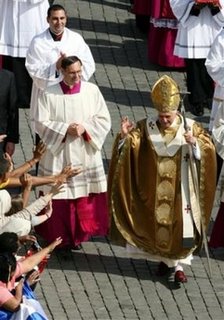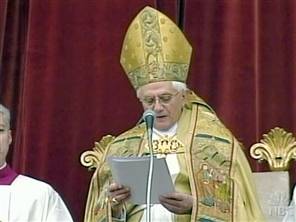
URBI ET ORBI MESSAGE
OF HIS HOLINESS
POPE BENEDICT XVI
Dear Brothers and Sisters in Rome and throughout the world,
From the depths of my heart, I wish all of you a blessed Easter. To quote Saint Augustine, “Resurrectio Domini, spes nostra – the resurrection of the Lord is our hope” (Sermon 261:1). With these words, the great Bishop explained to the faithful that Jesus rose again so that we, though destined to die, should not despair, worrying that with death life is completely finished; Christ is risen to give us hope (cf. ibid.).
Indeed, one of the questions that most preoccupies men and women is this: what is there after death? To this mystery today’s solemnity allows us to respond that death does not have the last word, because Life will be victorious at the end. This certainty of ours is based not on simple human reasoning, but on a historical fact of faith: Jesus Christ, crucified and buried, is risen with his glorified body. Jesus is risen so that we too, believing in him, may have eternal life. This proclamation is at the heart of the Gospel message. As Saint Paul vigorously declares: “If Christ has not been raised, our preaching is in vain and your faith is in vain.” He goes on to say: “If for this life only we have hoped in Christ, we are of all men most to be pitied” (1 Cor 15:14,19). Ever since the dawn of Easter a new Spring of hope has filled the world; from that day forward our resurrection has begun, because Easter does not simply signal a moment in history, but the beginning of a new condition: Jesus is risen not because his memory remains alive in the hearts of his disciples, but because he himself lives in us, and in him we can already savour the joy of eternal life.
The resurrection, then, is not a theory, but a historical reality revealed by the man Jesus Christ by means of his “Passover”, his “passage”, that has opened a “new way” between heaven and earth (cf. Heb 10:20). It is neither a myth nor a dream, it is not a vision or a utopia, it is not a fairy tale, but it is a singular and unrepeatable event: Jesus of Nazareth, son of Mary, who at dusk on Friday was taken down from the Cross and buried, has victoriously left the tomb. In fact, at dawn on the first day after the Sabbath, Peter and John found the tomb empty. Mary Magdalene and the other women encountered the risen Jesus. On the way to Emmaus the two disciples recognized him at the breaking of the bread. The Risen One appeared to the Apostles that evening in the Upper Room and then to many other disciples in Galilee.
The proclamation of the Lord’s Resurrection lightens up the dark regions of the world in which we live. I am referring particularly to materialism and nihilism, to a vision of the world that is unable to move beyond what is scientifically verifiable, and retreats cheerlessly into a sense of emptiness which is thought to be the definitive destiny of human life. It is a fact that if Christ had not risen, the “emptiness” would be set to prevail. If we take away Christ and his resurrection, there is no escape for man, and every one of his hopes remains an illusion. Yet today is the day when the proclamation of the Lord’s resurrection vigorously bursts forth, and it is the answer to the recurring question of the sceptics, that we also find in the book of Ecclesiastes: “Is there a thing of which it is said, ‘See, this is new’?” (Ec 1:10). We answer, yes: on Easter morning, everything was renewed. “Mors et vita, duello conflixere mirando: dux vitae mortuus, regnat vivus – Death and life have come face to face in a tremendous duel: the Lord of life was dead, but now he lives triumphant.” This is what is new! A newness that changes the lives of those who accept it, as in the case of the saints. This, for example, is what happened to Saint Paul.
Many times, in the context of the Pauline year, we have had occasion to meditate on the experience of the great Apostle. Saul of Tarsus, the relentless persecutor ofChristians, encountered the risen Christ on the road to Damascus, and was “conquered” by him. The rest we know. In Paul there occurred what he would later write about to the Christians of Corinth: “If anyone is in Christ, he is a new creation; the old has passed away, behold, the new has come” (2 Cor 5:17). Let us look at this great evangelizer, who with bold enthusiasm and apostolic zeal brought the Gospel to many different peoples in the world of that time. Let his teaching and example inspire us to go in search of the Lord Jesus. Let them encourage us to trust him, because that sense of emptiness, which tends to intoxicate humanity, has been overcome by the light and the hope that emanate from the resurrection. The words of the Psalm have truly been fulfilled: “Darkness is not darkness for you, and the night is as clear as the day” (Ps 139 [138]:12). It is no longer emptiness that envelops all things, but the loving presence of God. The very reign of death has been set free, because the Word of life has even reached the “underworld”, carried by the breath of the Spirit (v. 8).
If it is true that death no longer has power over man and over the world, there still remain very many, in fact too many signs of its former dominion. Even if through Easter, Christ has destroyed the root of evil, he still wants the assistance of men and women in every time and place who help him to affirm his victory using his own weapons: the weapons of justice and truth, mercy, forgiveness and love. This is the message which, during my recent Apostolic Visit to Cameroon and Angola, I wanted to convey to the entire African continent, where I was welcomed with such great enthusiasm and readiness to listen. Africa suffers disproportionately from the cruel and unending conflicts, often forgotten, that are causing so much bloodshed and destruction in several of her nations, and from the growing number of her sons and daughters who fall prey to hunger, poverty and disease. I shall repeat the same message emphatically in the Holy Land, to which I shall have the joy of travelling in a few weeks from now. Reconciliation – difficult, but indispensable – is a precondition for a future of overall security and peaceful coexistence, and it can only be achieved through renewed, persevering and sincere efforts to resolve the Israeli-Palestinian conflict. My thoughts move outwards from the Holy Land to neighbouring countries, to the Middle East, to the whole world. At a time of world food shortage, of financial turmoil, of old and new forms of poverty, of disturbing climate change, of violence and deprivation which force many to leave their homelands in search of a less precarious form of existence, of the ever-present threat of terrorism, of growing fears over the future, it is urgent to rediscover grounds for hope. Let no one draw back from this peaceful battle that has been launched by Christ’s Resurrection. For as I said earlier, Christ is looking for men and women who will help him to affirm his victory using his own weapons: the weapons of justice and truth, mercy, forgiveness and love.
Resurrectio Domini, spes nostra! The resurrection of Christ is our hope! This the Church proclaims today with joy. She announces the hope that is now firm and invincible because God has raised Jesus Christ from the dead. She communicates the hope that she carries in her heart and wishes to share with all people in every place, especially where Christians suffer persecution because of their faith and their commitment to justice and peace. She invokes the hope that can call forth the courage to do good, even when it costs, especially when it costs. Today the Church sings “the day that the Lord has made”, and she summons people to joy. Today the Church calls in prayer upon Mary, Star of Hope, asking her to guide humanity towards the safe haven of salvation which is the heart of Christ, the paschal Victim, the Lamb who has “redeemed the world”, the Innocent one who has “reconciled us sinners with the Father”. To him, our victorious King, to him who is crucified and risen, we sing out with joy our Alleluia!
© Copyright 2009 - Libreria Editrice Vaticana























